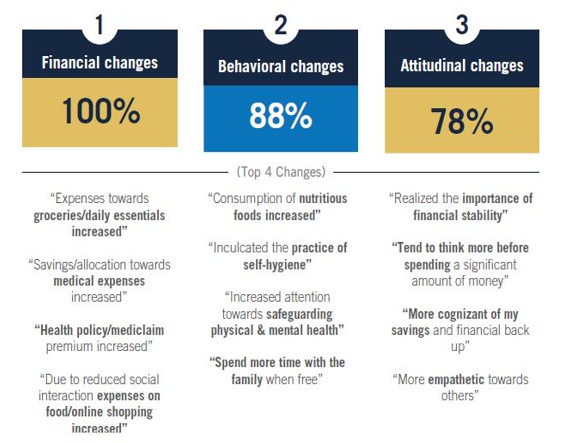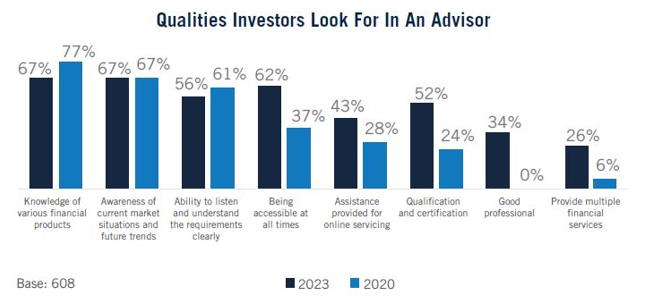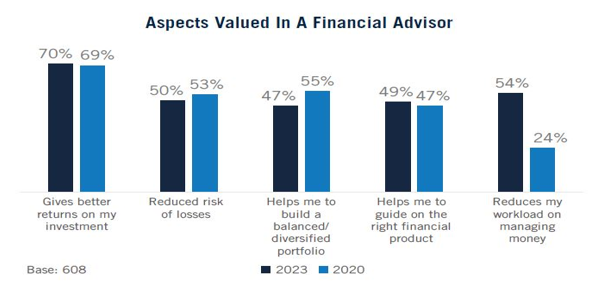Retirement is the only financial goal for which one cannot get a conventional loan
BFSI Industry Interview

Mr. Ajit Menon is the Chief Executive Officer of PGIM India Asset Management Pvt. Ltd. As CEO, Ajit oversees all aspects of the asset management business, including mutual fund, portfolio management services and Alternates. Ajit is responsible for the direction of the business and its growth strategy.
An industry veteran, Ajit has over two decades of leadership experience in business strategy, distribution, sales and marketing. He has been associated with the MF space since his stint at Standard Chartered Bank from 1997 and has worked with DSP BlackRock and Tata Asset Management. Prior to that he has worked with Vodafone and Crompton Greaves.
He has contributed to key industry bodies and is a sought after speaker at various domestic forums and conferences. He has co-designed a six-month certification course in wealth management and a two-month retirement readiness certification course for business partners. Financial Wellness and especially the area of retirement has been a continuing passion.
Ajit enjoys sketching portraits and recording songs when he gets a chance. Reading everything from mythology, history to nutrition helps him bring insights form other fields to connect the dots on money & happiness for clients, partners, family and friends.
His wife Alina is a ICF certified Master Coach and runs a coach certification firm, alongside coaching several CXOs across industry. His daughter Aashia (21) will graduate from Boston University next year and his son Aymaan (17) is studying and pursuing football in Spain.
The pandemic had an impact on people’s psyche with respect to money. What are the aspects that have been affected post covid and how did it affect the common man?
Pandemic has been a key driver for many in several ways. In the survey, we found that 48% of those surveyed underwent changes with respect to their attitude, behavior and finances.
The emphasis on ‘self-Identity’, ‘Self-Care” & ‘Self-Worth’ have emerged as more important than ever alongside fulfilling roles and responsibilities towards ones family.
We saw a visible attitudinal shift (reading more, being more emphatic towards others, thinking before making large purchases etc.) and a behavioral shift (consumption of nutritious food, self-hygiene, learning to cook, etc.). Overall, the pandemic seems to have impacted certain significant aspects.

The pandemic had a major shift in the investment pattern amongst investors. Could you shed some light on the major shifts?
When asked what kinds of investments Indians prefer investing post-retirement, the survey found that Indian investors prefer investing in fixed/recurring deposits and annuities/insurance, followed by gold and Post Office Savings Scheme (POSS).
Investments in mutual funds is also gaining traction (increased to 23% in 2023, from 10% in 2020 survey), over equity stocks/shares investments and exchange traded funds (reduced to 7% in 2023 from 18% in 2020 survey).
Indians with a retirement plan in place are bit more open to mutual funds as compared those who don’t have one. In the 2023 survey results, we found that the respondents who either have a financial plan in place or do not have one, both majorly invest in fixed income and annuities, but the ones who have a plan in place also prefer mutual funds a bit more (24%) than those who do not have a retirement plan (21%).
In addition to this, a very significant aspect to highlight is - Indians are getting sensitized about saving into retirement schemes like National Pension Scheme (NPS), which constituted 15% of the overall share in comparison to only 5% in 2020 survey and Public Provident Fund (PPF) is preferred by 13% of respondents in comparison to that of only 3% in 2020 survey.
What in your opinion are the major drivers for this shift?
Undoubtedly, the challenges posed by the pandemic has been a major driver for this shift. Typically, investors were more focused around ‘expected’ events like their expenses and financial commitments and less focused on ‘unexpected’ events like a health emergency or job loss and ‘external’ events like an economic slowdown or impact due to inflation. Investors are now increasingly becoming aware of the impact of inflation on their finances long term. This is evident by the growing acceptance of mutual funds and NPS among investors. Besides, post the pandemic, while Indians continue to remain aspirational, there has been a renewed focus on health and fitness. The rise in importance of retirement planning and planning for contingencies is testimony to the same.
What methodology was deployed for conducting the study? What was the criteria for identifying the respondents?
We appointed NielsenIQ for conducting this survey among 3009 Indian adults aged between 26-60 years (26-40: 19%, 41-50: 38%, 51-60: 43%) inclusive of both Men (80%) and Women (20%), covering Salaried (54%), Businessman/Self-employed professionals (46%). The survey was conducted in 15 cities (Metros: 60%, Tier 1: 40%) across India.
The research tried to decode the consumers to understand their psychographic traits that drive behavior towards money and money management, understanding the retirement planning landscape - attitude & behavior and decode the themes of ‘Trust’ & ‘Freedom’ and its implications on retirement planning. The study was done in two phases – qualitative and quantitative.
The respondents were identified based on whether they are financial decision makers, are aware of financial investment instruments like Mutual Funds, National Pension schemes (NPS), Fixed and recurring deposits, Public provident fund (PPF), Bonds, Debentures, Post office savings schemes (POSS), Life insurance policies and those who have done some retirement planning - investing/saving from a retirement perspective and not for short term goals.
The average annual income level of the respondents was around Rs 12 lakh. This helps us present findings for the largest representative retail investor audience in the country.
What were the key takeaways from the survey?
- Income allocation to loans and liabilities increases with increase in personal income. Indians are allocating 59% of their money to household expenses and a good 18% to paying off loans, a bit more than the 2020 survey findings.
- There has been a conscious effort towards building human capital, where 5% of income or loans is allocated towards skill development or education loans.
- With lower income, there’s a higher focus on generating more returns & being financially secure. As income increases, other facets like reaching a higher position in the current workplace and developing a passive income source takes precedence.
- Post pandemic, Indians have started putting more emphasis on long-term commitments like medical emergencies and retirement planning, in addition to family security.
- Worry about ‘lack of an alternate source of income’, related to managing finances post pandemic showed a significant jump from 8% in 2020 to 38% in 2023.
- With changing lifestyle and macro-economic conditions, Indians think they require 10-12 times of their annual income to build their retirement corpus, up from 8-9 times in the 2020 survey.
- Around 70% respondents (2023) compared to 89% in 2020 survey reported they feel financially secure staying in joint families.
- Having an alternate source of income significantly increases the sense of preparedness for retirement. Of 36% respondents who have an alternate income source, 42% get an extra income from investing in financial assets. A further 39% of respondents said that they are thinking of building a secondary source of income.
- Indians seem to need a bit more handholding and support to efficiently plan for retirement, investing in insurance and seeking advice from insurance agents is considered being financially secure or planned for retirement. Around 2/3rd of respondents who took financial advice took it from insurance agents and a small percentage from Registered Investment Advisors.
- Sharing workload on managing money is the most valued aspect about advisors, by those who seek financial advice. However, today only 10% of those who have a retirement plan, seek proper financial planning services from a Registered Investment Advisor and only 16% of those who have a written plan, have vetted their plan with a Registered Investment advisor.
- Even though the loyalty of over 55% individuals to their organizations has grown, a significant majority, about one third experience financial anxiety. Out of which around 2/3rd believe it negatively impacts their productivity for at least half of the day.
- Organizations can impact successful retirement planning and ensure financial wellness among their employees, thereby reaping benefits of increased employee loyalty and productivity. 1 in 2 respondents felt that their loyalty towards their employer would increase if the employer drives or facilitates their retirement/financial planning.
PGIM has been known for offering meticulously designed wealth creating solutions to investors. How are you going to use the insights from the survey to curate financial products in future?
PGIM is a global leader in providing access to investing and retirement security. In India, we offer 20 open-ended funds across debt, equity and hybrid funds. We have consciously stayed away from launching thematic/sectoral funds. In fact, our global Fund of Funds also offer diversification across countries, sectors, themes and market caps. Going ahead, we may introduce a few funds in the Large & Midcap and the Retirement category.
A large part of solutioning is also how we approach it from a behavioral point of view. We have recently established a new division called the Centre of Excellence headed by Dr. Sagneet Kaur. She holds a PhD in Behavior Science and will focus on embedding relevant aspects into our product design, features and communication including building technology driven tools that make the financial wellness journey much more smoother.
It is a known fact that the earlier one starts with retirement planning the better it is. However there are a few who have not started their retirement planning even at the age of 50. What is your message to such investors?
Retirement is the only financial goal for which one cannot get a conventional loan. One can always fill the gap through a loan if they fall short for any of their financial goals like education, home, car or business. Thus, planning for it from the day we start earning is way more essential than achieving any other financial goal in our lives.
The survey found that a significantly higher proportion of self-employed professionals (52%) think that they don’t need a financial plan. This could be driven by the idea that they do not have a defined “retirement age”.
Our previous survey found that retirement planning is mostly linked to income and not so much with age. Nevertheless, those who have started late have to increase savings and investing to catch up with the lost time. It is also advisable to clear off any debt or not to take up new debt at this juncture. Retirement should not be viewed as a destination but it is rather a journey. One should look at ways to build a secondary source of income which can be useful after formal retirement from workplace.
Our advice to those over 50 would be for them to first think about maximizing their savings as best possible. Further, think about working on an existing secondary skill that they can monetize into the future or purposefully building a secondary skill that they would enjoy doing for a longer period regardless of the quantum of financial reward. They could teach, be a yoga or fitness instructor, work with pets, consult in an area of expertise etc. This has the dual benefit of squirrelling away a sum into a long-term investment bucket as they draw down on their primary corpus. The second being the benefit that accrues from being meaningfully engaged and active physically that will contribute to a good ‘health-span’ as some experts call it. Living longer is another real risk and the better your health the more meaningful will be your wealth.
In your opinion how will inflation affect the investment strategy?
Rising prices can impact retirees living on a fixed income, reducing their spending capability. We believe allowing your investments to compound even for a few years more can have sizeable difference in investors wealth over long run.
According to a United Nations report, globally, the population aged 65 and over is growing faster than all other age groups. A study by Plum titled "Health Report of Corporate India 2023" states that India has one of the highest medical inflation rate of 14% in Asia (as of 2021) and over 71% of Indians pay for a majority of their healthcare expenses out of their pocket.
Thus, investors should plan their accumulation as well as withdrawal strategy factoring in the risk of increasing life expectancy as mentioned before, inflation, and rising healthcare costs.
PGIM’s research shows that a prolonged period of higher inflation has important implications for investor outcomes. Strategic allocations like a 60/40 split between equities and nominal bonds have historically delivered lower real returns in periods of elevated inflation. Investors should consider larger allocations to asset classes with a positive exposure to inflation, such as commodities and real estate, given their historical strength in high-inflation environments. Real assets with a positive exposure to inflation could potentially help investors better position their portfolios for meaningfully improved outcomes.

According to the survey, what was the major cause of apprehension amongst investors with respect to their retirement?
Compared to 2020 survey results, Indians have started worrying more about external events (+47% from 2020 survey) like inflation, economic slowdown and stability of job & income and the unexpected events (+21% from 2020 survey) like hospitalization/incurring medical expenses, critical or terminal illness and loss of income due to recession or natural calamity, which seem to motivate them to plan for retirement. The percentages remain consistent with 2020 survey results for the ‘expected’ events category.
The results point to the recent macro-economic changes making people worry about loss of job or income due to recently seen recession; on the other hand how pandemic has impacted peoples’ thought processes, financial preferences and decision-making. This led them to worry about sudden, unexpected heavy hospitalization or loss of earning member of the family. Future surveys will tell if this trend holds or is a temporary one.
The survey found that respondents from metro (77%), self-employed professionals (83%) & those with a monthly income up to 50k (78%) are significantly worried about the unexpected aspects while planning for retirement.
The survey found some interesting insights on the qualities investors look for from their advisor/MFD. Can you share these findings?
In the era of information overload, investors are looking for a skilled advisor who can sift information from noise and provide them bespoke solutions all under one roof. This was evident in the survey, where 3 in 4 respondents mentioned awareness of current market & knowledge of various financial products are to be the top qualities they look for in a financial advisor followed by being always accessible. Further, Indians are looking for advisors who offer multiple products/services under one roof.

*Complete statements are “Good Professional (in terms of timeliness, grooming, knowledge and servicing)” and “Provide Multiple financial services (provided for services such as mutual funds, shares/ stocks, tax filing, loans, health & life insurance etc.)”
What aspect of managing money by an advisor do investors value the most?
The survey found that getting better returns (Driven by Metro, Females and those with a monthly income of 20K-50K) is the most important aspect that investors value if they take advisory services, followed by reducing workload of managing money. The percentage of respondents who want others to manage their money to reduce their workload on managing money has almost doubled to 54% in 2023 from 24% in 2020.

Mutual Fund Investments are subject to market risk, read all scheme related documents carefully
Recent Interviews
-
Partner Connect by Advisorkhoj with Mr Amit Kalra Glorious Path Pvt Ltd New Delhi
Dec 5, 2025
-
Partner Connect by Advisorkhoj with Mr Alok Dubey PrimeWealth Pune
Dec 1, 2025
-
In Conversation by Advisorkhoj with Ms Aparna Shanker Chief Investment Officer Equity The Wealth Company Mutual Fund
Nov 28, 2025
-
In Conversation by Advisorkhoj with Mr Sanjay Bembalkar Head Equity Union MF
Nov 28, 2025
-
In Conversation by Advisorkhoj with Mr Arjun Khanna Equity Fund Manager Kotak Mutual Fund
Nov 17, 2025
Fund News
-
The Wealth Company Mutual Fund launches The Wealth Company Gold ETF
Dec 16, 2025 by Advisorkhoj Team
-
Axis Mutual Fund launches Axis Gold and Silver Passive FOF
Dec 10, 2025 by Advisorkhoj Team
-
Jio BlackRock Mutual Fund launches JioBlackRock Arbitrage Fund
Dec 9, 2025 by Advisorkhoj Team
-
Tata Mutual Fund launches Tata BSE Multicap Consumption 50:30:20 Index Fund
Dec 9, 2025 by Advisorkhoj Team
-
Edelweiss Mutual Fund launches Edelweiss Silver ETF Fund of Fund
Dec 8, 2025 by Advisorkhoj Team





